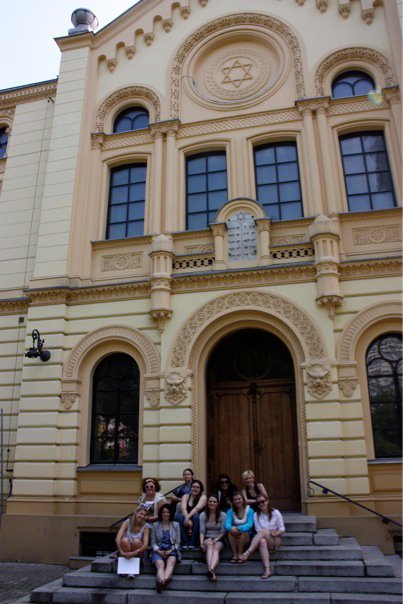If Poland to Jews around the world represents one big Jewish cemetery, it goes without saying that for them, Jewish life in Poland is dead. Then, how can there still be Jews in Poland? After the Holocaust, after the 1948 Kielce Pogrom, and after the 1968 Jewish purges? It follows, that there must not be any Jews left in Poland, it only makes sense.
Yet, one thing I discovered in Poland- there are Jews, and even more, it’s not just an old survivor based community- there are young Jews, there are Jewish communities, there are secular Jews and there are religious Jews. There is a rich Jewish community and culture developing in Poland today, something that is incredibly admirable. I was at the Nozyk synagogue in Warsaw for my second Shabbat in Poland, and me and my friend Alexandria were standing in the hallway, when we heard a group of girls behind us, looking like very religious Jews, speaking in Polish together. Polish! They should be talking English, Hebrew, Yiddish, but Polish?
The current Jewish community is carving out their own space within Poland, they are creating a new Jewish culture, that combines elements from the past, but has the mark of a new generation. They are creating Judaism in Poland, a place where even after the darkest chapter in Jewish history, being a Jew was dangerous, and unstable.
Interwar Poland saw the outburst of the Jewish question, and even more than this, the development of the Jewish identity. Jews were playing with concepts of nationality, some that saw Poland as their future, or those whose nationalist feelings turned to Zionism and Palestine. But there were others, Jews who defined themselves purely religiously, those that assimilated, those that wanted to acquire autonomy based on culture. The Jewish question in Poland allowed for incredible Jewish creativity, such creativity that spilled over into America, and now Israel. Yet, the Holocaust decisively killed this Jewish creativity in Poland, and then communism froze any hope of a continuation of the debate. But, in the 70′s when underground independent intellectual groups began to pop up in Poland, a Jewish one started to flourish. Calling themselves the “Jewish flying university“, a mixed group of Poles met. At first, it was awkward, none of them had ever discussed Jewishness in public, some not even admitting their own Jewishness. Many were from assimilated or mixed backgrounds, who knew almost nothing about their Judaism as a religion or culture. But slowely, they began to piece together Jewish past in Poland, and discover who they were, and what kind of future could be for Jews in Poland.
Since the fall of communism, there has been a slow Jewish revival in Poland. On a Friday night dinner, I sat listening to the Chief Rabbi of Poland Michael Shudrich explain at a community dinner at Nozyk, about the community. He addressed the locals, and also visitors, like myself, who needed a place to eat for Shabbat. He told us of people who were returning to Judaism, who had pretended to be Catholic after the war, because it was safer, but discovered they were Jewish, many through weird customs or a Jewish artifact. He told us of a female who lit candles on Friday night, not knowing why. Someone who never ate milk and meat together. Someone who found books in weird writing in their attic. Jews were slowly discovering Jewish roots, and once discovered, flourished within this identity.
My group visited the JCC in Krakow, and they too boast a Friday night dinner every week. As we sat in the largeJCC, in the middle of the historical neighborhood of Kazimierz, we were told that everyday the JCC signs up new members. People who have discovered that someone in their family was Jewish and who want to be involved with the Jewish community. When we were in Bialystok, we met with the head of the Jewish community, and as she served as coffee and cookies, she explained that her Jewish community regularly meet, and hold cultural events. When we were in Warsaw, we met at “Tel Aviv“, one of the hip kosher restaurants, with a Jewish community leader that told us about Jewish daycare, Jewish trips to Israel, and Jewish cultural groups that meet. She insisted that antisemitism was low, and that for the first time in a long time, Jews were proud to be Jews, and walk proudly on the streets as such. All these people would laugh, if someone were to insist that there are no Jews in Poland, or more that Jewish culture was over in Poland. For them, it’s thriving.
It’s true that the Jewish community in Poland today is small in comparison to what it used to be, however this should not allow us to ignore what is developing there. Perhaps it will never be what it was, but I think that’s ok. It makes me happy to know that there are Jews in Poland. They are carrying on the legacy of the past, and adding something new and special. They may live in a country with concentration and death camps, but they don’t allow this to define who they are, and where they are going. They represent life, and they are following in the Jewish tradition that has defined Jews throughout Jewish history: we can continue, and we can go on; to create and grow.
